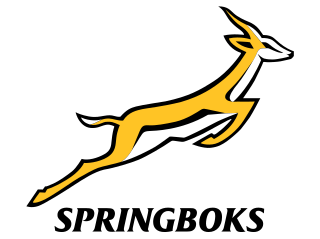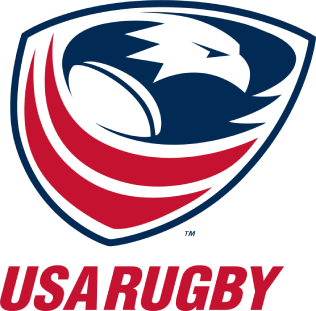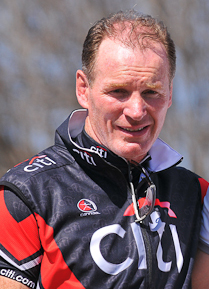
The British & Irish Lions is a rugby union team selected from players eligible for the national teams of England, Ireland, Scotland, and Wales. The Lions are a test side and most often select players who have already played for their national team, although they can pick uncapped players who are eligible for any of the four unions. The team tours every four years, with these rotating between Australia, New Zealand and South Africa in order. The most recent test series, the 2021 series against South Africa, was won 2–1 by South Africa.

The New Zealand national rugby union team, commonly known as the All Blacks, represents New Zealand in men's international rugby union, which is considered the country's national sport. Famed for their international success, the All Blacks have often been regarded as one of the most successful sports teams in history.

The South Africa national rugby union team commonly known as the Springboks, is the country's national team governed by the South African Rugby Union. The Springboks play in green and gold jerseys with white shorts. Their emblem is a native antelope, the Springbok, which is the national animal of South Africa. The team has been representing South African Rugby Union in international rugby union since 30 July 1891, when they played their first test match against a British Isles touring team. Currently, the Springboks are the number one ranked rugby team in the world and are the reigning World Champions, having won the World Cup on a record four occasions. Incredibly, the Springboks have won half of the Rugby World Cups they've attended. They are also the second nation to win the World Cup consecutively.

The Australia national rugby union team, nicknamed the Wallabies, is the representative national team in the sport of rugby union for the nation of Australia. The team first played at Sydney in 1899, winning their first test match against the touring British Isles team.

The Samoa national rugby union team represents the Samoa Rugby Union in men's international rugby union. They are also known as "Manu Samoa", which is thought to derive from the name of a Samoan warrior. They perform a traditional Samoan challenge called the siva tau before each game. Samoa Rugby Union were formerly members of the Pacific Islands Rugby Alliance (PIRA) along with Fiji and Tonga. They are ranked 11th in the world.

The Fiji national rugby union team represents Fiji in men's international rugby union. Fiji competed in the Pacific Tri-Nations and now competes in its successor tournament Pacific Nations Cup. Fiji also regularly plays test matches during the June and November test windows. They have beaten the major rugby playing sides of Wales, Scotland, Australia, France, Italy, Argentina and England. The only major sides Fiji are yet to beat are New Zealand, South Africa and Ireland.

The Tonga national rugby union team represents the Tonga Rugby Union in men's international rugby union. The team is nicknamed ʻIkale Tahi . Like their Polynesian neighbours, the Tongans start their matches with a traditional challenge – the Sipi Tau. They are members of the Pacific Islands Rugby Alliance (PIRA) along with Fiji and Samoa. The Ikale Tahi achieved a historic 19–14 victory over France in the 2011 Rugby World Cup, but having lost to New Zealand and Canada, were unable to achieve what would have been their first-ever presence at the quarter-finals.

The United States men's national rugby union team, nicknamed the Eagles, represents the United States of America Rugby Football Union in men's international rugby union. USA Rugby is the national governing body for the sport of rugby union in the United States, and is a member of Rugby Americas North, one of six regional governing bodies under World Rugby. Until rugby returned to Olympic competition, with sevens at the 2016 Rio Games, the United States was the reigning Olympic rugby champion, having defeated the one other competitor in 1920 and the two other competitors at the 1924 Summer Olympics.

Simon Paul Poidevin is a former Australian rugby union player. Poidevin made his Test debut for Australia against Fiji during the 1980 tour of Fiji. He was a member of the Wallabies side that defeated New Zealand 2–1 in the 1980 Bledisloe Cup series. He toured with the Eighth Wallabies for the 1984 Australia rugby union tour of Britain and Ireland that won rugby union's "grand slam", the first Australian side to defeat all four home nations, England, Ireland, Wales and Scotland, on a tour. He debuted as captain of the Wallabies in a two-Test series against Argentina in 1986, substituting for the absent Andrew Slack. He was a member of the Wallabies on the 1986 Australia rugby union tour of New Zealand that beat the All Blacks, one of six international teams and second Australian team to win a Test series in New Zealand. During the 1987 Rugby World Cup, he overtook Peter Johnson as Australia's most capped Test player against Japan, captaining the Wallabies for the third time in his 43rd cap. He captained the Wallabies on a fourth and final occasion on the 1987 Australia rugby union tour of Argentina before injury ended his tour prematurely. In 1988, he briefly retired from international rugby, reversing his decision 42 days later ahead of the 1988 Bledisloe Cup series. Following this series, Poidevin returned to the Australian side for the single 1989 Bledisloe Cup Test. He returned full-time to the Australian national squad for the 1991 season. Poidevin was a member of the Wallabies that won the 1991 Rugby World Cup, after which he retired from international rugby union.

Rugby union in Fiji is a popular team sport and is considered to be the national sport of the country. The sport was introduced to Fiji in the 1880s. Fiji is defined as a tier two rugby nation by World Rugby. The national team has competed at the Rugby World Cup and made it as far as the quarter-finals. Their sevens team is also noted for their success, winning multiple Olympic gold medals, World Rugby Sevens Series and Rugby World Cup Sevens.

The Original All Blacks were the first New Zealand national rugby union team to tour outside Australasia. They toured the British Isles, France and the United States of America during 1905–1906. Their opening game, on 16 September 1905, was against Devon whom they defeated 55–4. They defeated every English side that they faced, including a 16–3 victory over English county champions Durham, and a 32–0 victory over Blackheath. They defeated Scotland, Ireland, and England with the closest of the three matches their 12–7 victory over Scotland. The team's only loss of the tour was a 3–0 defeat by Wales at Cardiff Arms Park. A try claimed by winger Bob Deans was not awarded by the referee and later became a subject of controversy. However, Wales were generally considered the better team with the All Blacks playing particularly poorly in the first half of the game. They managed narrow wins against four Welsh club teams and went on to play France in France's first-ever test match. They returned to New Zealand via North America where they played two matches against Canadian teams. Overall they played a total of thirty-five matches, which included five Tests, and only lost once—the defeat by Wales.

The 1888–89 New Zealand Native football team was a New Zealand rugby union team that toured Britain, Ireland, Australia and New Zealand in 1888 and 1889. It mostly comprised players of Māori ancestry, but also included some Pākehā. A wholly private endeavour, the tour was not under the auspices of any official rugby authority; it was organised by New Zealand international player Joseph Warbrick, promoted by public servant Thomas Eyton, and managed by James Scott, a publican. The Natives were the first New Zealand team to perform a haka, and also the first to wear all black. They played 107 rugby matches during the tour, as well as a small number of Victorian Rules football and association football matches in Australia. Having made a significant impact on the development of New Zealand rugby, the Natives were inducted into the World Rugby Hall of Fame in 2008.

South African Barbarians is an invitational rugby union club styled along the lines of Barbarian F.C. It was formed in 1960 by Frank Mellish, the former 1951–52 Springbok selector and manager, together with former Natal Rugby Union President, Harry Stacey. The club is directly affiliated to the South African Rugby Union.
In 1977 the British Lions rugby union team toured New Zealand. The Lions played 26 matches, including four internationals against the All Blacks. They lost the series against the All Blacks by three matches to one. The team played as the British Isles in their internationals against the All Blacks and the British Lions for the non-international games. Unlike all previous tours to New Zealand, the Lions did not play any matches in Australia, though one game was also played at Buckhurst Park, Suva, against Fiji.
The 2005 New Zealand Rugby Union tour of Britain and Ireland was a Grand Slam Rugby Union tour played by the New Zealand National Rugby Union team, also known as the All Blacks, in the United Kingdom and in the Republic of Ireland against their respective national teams. Played through November, it consisted of 4 matches against Wales, Ireland, England and Scotland.
In 1978 the New Zealand national rugby union team, the All Blacks, toured Britain and Ireland. They were the eighth All Black team to undertake a full tour of the countries and became the first to achieve a Grand Slam by beating the national teams of Ireland, Wales, England and Scotland. The previous seven touring teams had either lost or drawn at least one international, or had not played all four nations.

Bradley Ronald Johnstone is a New Zealand rugby union administrator and former player who is currently the president of the North Shore Rugby Football Club. He played as a prop
The 2012 autumn internationals, also known as the autumn tests, November tests and, in the Southern Hemisphere, the end of year tests, were international rugby union matches. They were predominantly played between visiting Southern Hemisphere countries and European nations.
Rugby union and apartheid had a complex and supportive relationship. From 1948 to 1994, international rugby relations with the country, and also the non-integrated nature of rugby within South Africa drew frequent controversy. South Africa remained a member of the International Rugby Board (IRB) throughout the apartheid era.
The History of the South Africa national rugby union team dates back to 1891, when the British Lions first toured South Africa where they played against South African representative sides. The South Africa national rugby union team played few international matches during a period of international sanctions due to apartheid. Since the end of apartheid in 1994, South Africa has once again fully participated in international rugby.













